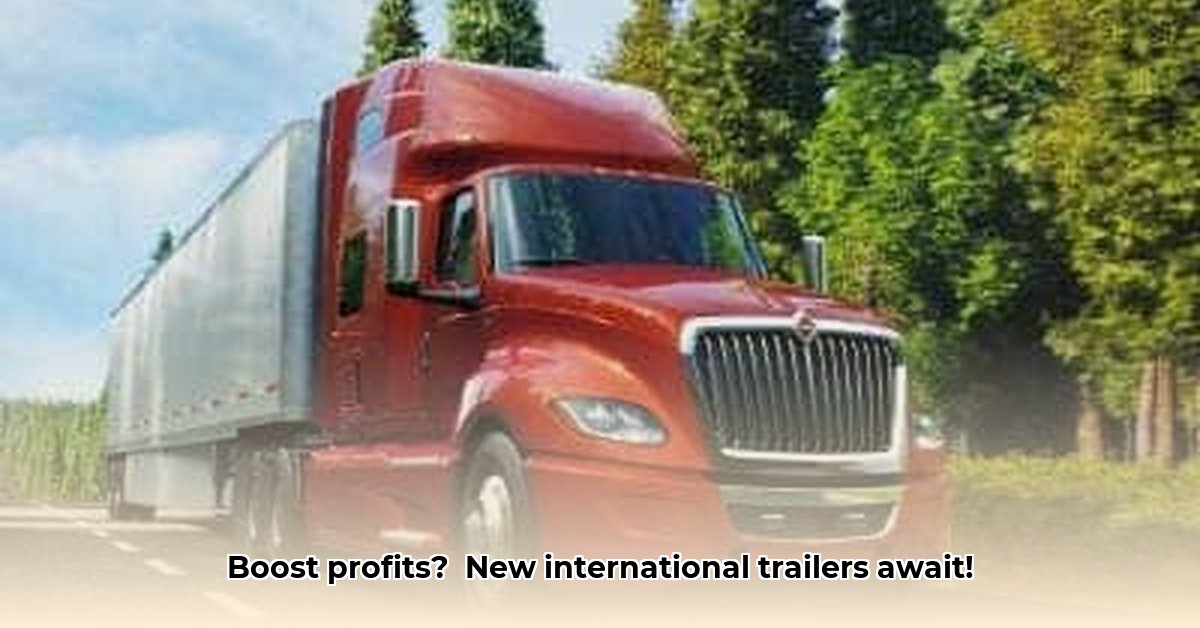
New International Tractor Trailers: Improving Your Bottom Line
Considering a fleet upgrade? International's newest tractor trailers aim to boost profitability. This article analyzes how these trucks can enhance your operations, focusing on practical applications and data-driven insights for commercial trucking professionals. While specific model details are not provided in the source material, the general principles of maximizing return on investment (ROI) remain central. For accident reports, see recent accident reports.
Built for Durability and Maximum Uptime
International emphasizes the robust build of its trucks, promising reduced downtime. Fewer breakdowns translate directly to increased revenue through less time in the repair shop and more time hauling freight. However, independent verification of these durability claims through long-term fleet studies is needed for complete validation. This lack of readily available comparative data highlights the importance of thorough due diligence before making a significant investment. Do your research and compare claims across multiple manufacturers. How much downtime do you currently experience? Could even a small reduction significantly impact your annual profitability?
Leveraging Smart Technology for Enhanced Efficiency
Modern International trucks likely incorporate technologies designed to improve efficiency. While specifics aren’t detailed here, features such as advanced safety systems (lane departure warnings, automatic emergency braking) and predictive maintenance alerts can potentially reduce operational costs. Preventing costly breakdowns through proactive maintenance is a key benefit. Nevertheless, the long-term cost-effectiveness of these features requires further investigation. Industry analyses comparing the return on investment (ROI) for different technological packages in various operating contexts would be valuable. Are similar technologies already utilized in your current fleet? How have they affected your operational efficiency?
Key Decision Factors: Choosing the Right Truck
Selecting a new truck requires careful consideration beyond aesthetics. Here are three critical areas to prioritize:
Total Cost of Ownership (TCO): TCO analysis goes beyond the initial purchase price. It encompasses fuel economy, routine maintenance, potential repairs, and resale value. A seemingly cheaper option may prove more expensive over the truck’s lifespan. How much time do you dedicate to your current TCO calculations? Could a dedicated TCO analysis program lead to substantial cost savings?
Payload and Capacity: Accurate assessment of your typical hauling needs is crucial. Matching truck capacity to your actual demands avoids wasted space and potential overweight fines. Overestimating your needs can lead to unnecessary expenses. What percentage of your current fleet's capacity is consistently utilized? This data will inform the optimal capacity for your next investment.
Regulatory Compliance: Understanding and adhering to environmental regulations is vital. Ensure your new truck meets current emission standards to avoid costly fines. Staying informed about regulatory changes is imperative for consistent compliance. What are the specific emission standards in your operating region? Have they changed recently? Are you fully compliant?
Comparative Analysis: Market Research is Essential
The trucking market is competitive. Before committing to a purchase, it’s crucial to research and compare International models with offerings from other manufacturers. Obtaining multiple quotes, consulting with peers, and conducting thorough research are vital steps. How many quotes do you typically obtain before a major purchasing decision? Have you evaluated your past purchase decisions, examining the outcomes against initial market research?
Future-Proofing Your Fleet: Industry Trends
The trucking landscape is dynamic. Emerging trends, such as sustainable fuel options (like electric or hydrogen) and autonomous driving technologies, will dramatically reshape the industry. Keeping abreast of these advancements is critical for adapting your business and capitalizing on future opportunities. How much of your current budget is allocated to researching potential future industry trends? What percentage of your fleet currently utilizes alternative fuels?
Risk Mitigation: Safeguarding Your Investment
Successful trucking business hinges on anticipating and mitigating risks. Strategic planning is essential.
| Risk Category | Mitigation Strategies |
|---|---|
| High Initial Investment | Explore financing options, lease agreements, or certified pre-owned trucks. |
| Fuel Price Volatility | Implement fuel-efficient driving techniques, optimize routes, and explore alternative fuels. |
| Driver Shortages | Offer competitive wages and benefits, invest in driver training and retention programs. |
| Regulatory Changes | Stay informed about upcoming regulations and consult with industry experts for guidance. |
| Technological Advancements | Continuously update your knowledge of industry advancements and adapt your strategies accordingly. |
Optimizing Total Cost of Ownership (TCO)
Calculating TCO involves a thorough assessment beyond just the initial purchase price.
Components of TCO
Acquisition Costs: This includes the purchase price, financing charges, trade-in values, and taxes.
Maintenance and Repairs: Factor in routine servicing, unexpected repairs, and parts replacements. Preventative maintenance programs can significantly impact this cost.
Operational Costs: Include fuel consumption, insurance, driver salaries, and tolls.
Disposal Costs and Residual Value: Consider how you plan to sell or trade the truck at the end of its life.
Step-by-Step TCO Calculation
Comprehensive Data Collection: Gather detailed data on all costs associated with your fleet.
Organized Cost Categorization: Sort data into the four categories outlined above.
Cost Projection: Estimate future costs for each category using past data, market trends, and expert opinions.
Total TCO Calculation: Sum all projected costs over a defined period (e.g., five years).
Analysis and Optimization: Review the TCO calculation, identifying opportunities for cost reduction. Implement strategies to improve fuel efficiency, reduce maintenance expenses, or strengthen driver retention.
The selection of new International tractor trailers offers potential advantages in terms of durability and technological integration. However, a comprehensive TCO analysis alongside careful market research and risk mitigation strategies remain crucial for assuring long-term profitability. Remember, the optimal truck for your business depends entirely upon your individualized operational needs.